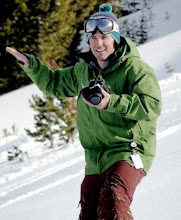Dr. S told me in class that the best thing to do in regards to my epiphany on the mountainside is to forget it and I have since read chapter 7 in WW yet somehow I find a bit of difficulty in this view of the epiphany. It doesn't quite jive.
The reason i find difficulty is because of another revelation (epiphany) that occurred in an English class last spring. Of course I'm speaking of Oral Traditions and my infatuation with the interconnected nature of the Memory, Imagination, and Soul.
It seems that an epiphany is a very soulful experience. It jerks at our souls, as I said before, It tells us "pay attention you idiot." As Taylor writes "Epiphany is a restlessness." For Mole, "A great Awe fell upon him, an awe that turned his muscles to water, bowed his head, and rooted his feet to the ground. It was no panic terror--indeed he felt wonderfullly at peace and happy--but it was an awe taht smote and held him and, without seeing he knew it could only mean that some august Presence was very, very near." The connection felt by mole and by all who experience true Awe epiphanies comes not from the senses but from the soul. The "restlessness" and the jerking is ones soul reaching out to be completely apart of the experience. To paraphrase Nick and his wonderful definition of Epiphany the manifestation takes hold of the subject's soul, entrances it, prods it, pokes it, distorts it, breaks it down, builds it back up, forces it into a deep/divine contemplation, and finally creates such longing the soul yearns for it after it's gone.
I think this yearning may sometimes be misconstrued as an attempt to understand an epiphany, as I did, trying to ascribe some concrete sentence to explain the purpose for my experience on the mountainside above the glowing alpine valley. Because discovering purpose in epiphanies is a fruitless endeavor, as even Eliot finds difficulty putting purpose into words, it would seem that forgetfulness would be the best self-defense mechanism for epiphanies so you don't drive yourself mad trying to find purpose in them.
However, because an epiphany affects the soul it equally affects the memory and the imagination. As it put it in Oral traditions, "The imaginaiton is the one hour photo center of the memory," and memory shapes the soul. Or as Frances Yates writes "What then is memory? It is in the sensitive part of the soul which takes the images of sense impressions; it therefore belongs to the same part of the soul as imagination, but it also per accidens in the intellectual part since the abstracting intellect works in it on the phantasmata. (Yates Art of Memory 71)
Thus, epiphanies can't and shouldn't be forgotten as Dr. S put it. Simply they should be remembered for what they were not what they meant. I can use my imagination to remember every little event on that mountainside yet I couldn't begin to explain any sort of purpose, and it moves my soul in nearly the same way. I would bet Abby feels the same about her Oxtail Soup and fine wine in a hole in the wall cafe in Rome. Both our experiences unforgettably jared our souls thus are unforgettably lodged in our imagination and our memory. With an epiphany the "what happened" memory is the crucial part not the "why happened." Would christianity exist if Moses forgot the burning bush? I don't even think he had an explanation for his experience but he remembered the "what" of it. For centuries wise men and scholars have busied themselves with deciphering the "why," the concept that eventually became christianity.
Yes the demi god supposedly gave Rat and Mole the gift of forgetfulness however they both retain some memory. They remember even if its "nothing but a dim sense of the beauty of it. The Beauty!" (127) or a voice whispering softly in the reeds (130). The lingering memory remains enough that I would be willing to bet Rat isn't dreaming of baseball and boating when he falls asleep in the prow, but rather of an unnamed melody played on a pan flute while the wind blows in the willows.
The "what happened" of an epiphany permanently imprints itself in the memory and imagination, shapes our souls, and in turn, shapes ourselves.
To best sumarize my aruguement I will once again rely on Frances Yates as I have throughout Oral Traditions and most likely the rest of my life. "Since the divine mind is universally present in the world of nature (continues Bruno in the Seal of Seals) the process of coming to know the divine mind must be through the reflection of the images of the world of sense within the mens (soul). Therefore the function of the imagination of ordering the images in memory is an absolutely vital one in the cognitive process. Vital and living images will reflect the vitality and life of the world." (Art of Memory 257)

No comments:
Post a Comment